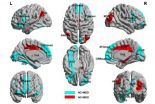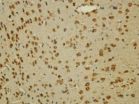(Press-News.org) According to a paper published in the Neural Regeneration Research (Vol. 9, No. 2, 2014), both depressive patients and healthy controls presented typical small-world attributes, and compared with healthy controls, characteristic path length was significantly shorter in depressive patients, suggesting development toward randomization. Patients with depression showed apparently abnormal node attributes at key areas in cortical-striatal-pallidal-thalamic circuits. In addition, right hippocampus and right thalamus were closely linked with the severity of depression. An artificial neural network algorithm was applied for classifcation research. The results showed that brain network metrics could be used as an effective feature in machine learning research, which brings about a reasonable application prospect for brain network metrics. The present study also highlighted a significant positive correlation between the importance of the attributes and the intergroup differences; that is, the more significant the differences in node attributes, the stronger their contribution to the classification. Experimental findings indicate that statistical significance is an effective quantitative indicator of the selection of brain network metrics and can assist the clinical diagnosis of depression.
INFORMATION:
Article: " Resting-state functional connectivity abnormalities in first-onset unmedicated depression," by Hao Guo1, Chen Cheng1, Xiaohua Cao2, Jie Xiang1, Junjie Chen1, Kerang Zhang2(1 College of Computer Science and Technology, Taiyuan University of Technology, Taiyuan 030024, Shanxi Province, China; 2 Department of Psychiatry, First Affiliated Hospital, Shanxi Medical University, Taiyuan 030002, Shanxi Province, China)
Guo H, Cheng C, Cao XH, Xiang J, Chen JJ, Zhang KR. Resting-state functional connectivity abnormalities in first-onset unmedicated depression. Neural Regen Res. 2014;9(2):153-163.
Contact: Meng Zhao
eic@nrren.org
86-138-049-98773
Neural Regeneration Research
http://www.nrronline.org/
Resting-state functional connectivity as an auxillary diagnosis of depression
2014-03-31
ELSE PRESS RELEASES FROM THIS DATE:
How does acupuncture at Baihui and Dazhui reduce brain cell apoptosis in heroin readdicts?
2014-03-31
Acupuncture has therapeutic effects on cerebral ischemia, dementia, epilepsy and other brain diseases, and also functions to repair the nervous system. Dazhui (GV14) and Baihui (GV20) are the preferred acupoints for treatment. However, whether acupuncture can treat addiction and prevent readdiction through changes to brain cell ultrastructure remains unknown. A research team from Anhui University of Traditional Chinese Medicine in China pointed out that cell apoptosis was observed in the hippocampus and frontal lobe of heroin readdicted rats by electron microscopy, and ...
Metformin does not improve heart function in patients without diabetes
2014-03-31
Although some research has suggested that metformin, a medication often used in the treatment of diabetes, may have favorable effects on ventricular (heart) function, among patients without diabetes who underwent percutaneous coronary intervention (PCI; a procedure such as stent placement used to open narrowed coronary arteries) for ST-segment elevation myocardial infarction (STEMI; a certain pattern on an electrocardiogram following a heart attack), treatment with metformin did not result in improved ventricular function, according to a JAMA study released online to coincide ...
Cleveland Clinic study shows bariatric surgery provides long-term control of diabetes
2014-03-31
Cleveland: A study by Cleveland Clinic researchers shows bariatric surgery is a highly effective and durable treatment for type 2 diabetes in obese patients, enabling nearly all surgical patients to be free of insulin and many to be free of all diabetic medications three years after surgery.
The STAMPEDE (Surgical Therapy And Medications Potentially Eradicate Diabetes Efficiently) trial was simultaneously published in the New England Journal of Medicine and presented today at the Annual Scientific Session of the American College of Cardiology in Washington, D.C.
The ...
Addicts who live in the moment may benefit most from certain kinds of treatment
2014-03-31
Drug-dependent people who least take the future into account may, paradoxically, be the ones to benefit the most from certain treatments.
The human instinct to choose instant gratification, such as a drug high, over a later benefit, such as good health — known as future or delay discounting — is strong in people with drug dependencies. An important component of addiction is failure to exert self-control in recognition of future consequences.
In a study in Clinical Psychological Science, a team of researchers has found an unexpected pattern that may provide hope for ...
Diamonds are an oil's best friend
2014-03-31
A mixture of diamond nanoparticles and mineral oil easily outperforms other types of fluid created for heat-transfer applications, according to new research by Rice University.
Rice scientists mixed very low concentrations of diamond particles (about 6 nanometers in diameter) with mineral oil to test the nanofluid's thermal conductivity and how temperature would affect its viscosity. They found it to be much better than nanofluids that contain higher amounts of oxide, nitride or carbide ceramics, metals, semiconductors, carbon nanotubes and other composite materials. ...
Academic workplace bias against parents hurts nonparents too
2014-03-31
Parents have reported before that trying to balance work and family obligations comes with career costs. But a new study from Rice University and the University of California, San Diego, shows that university workplace bias against scientists and engineers who use flexible work arrangements may increase employee dissatisfaction and turnover even for people who don't have children.
"As researchers, we're interested in understanding the gap between the traditional 9-to-5 work setting and what workers actually need," said Erin Cech, an assistant professor of sociology at ...
Clonidine doesn't reduce deaths or heart attack after non-cardiac surgery
2014-03-31
WASHINGTON (March 31, 2014) — Clonidine – a drug that reduces blood pressure and heart rate – increased rates of clinically concerning hypotension and non-fatal cardiac arrest after noncardiac surgery, according to the POISE-2 trial presented at the American College of Cardiology's 63rd Annual Scientific Session. With more than 10,000 patients in 23 countries, this randomized clinical trial is the largest study of clonidine in surgical patients.
The study's findings caught researchers by surprise. The earlier POISE-1 study found that beta blockers greatly reduced risk ...
Major bleeds rise with perioperative aspirin for non-cardiac surgery
2014-03-31
WASHINGTON (March 31, 2014) — Patients given aspirin to prevent heart problems after non-heart-related surgery had a higher risk of serious bleeding than the patients who did not receive aspirin. At the same time, aspirin did not reduce incidence of post-operative heart attacks and death, according to data from POISE-2 presented at the American College of Cardiology's 63rd Annual Scientific Session. POISE-2 is the largest clinical trial focused on major cardiovascular complications in non-cardiac surgery.
Although many guidelines address prophylactic aspirin in a surgical ...
BUSM study finds increasing health coverage does not improve readmission rates
2014-03-31
Boston—In a first of its kind retrospective study, Boston University School of Medicine (BUSM) researchers have found that providing health insurance coverage to previously uninsured people does not result in reducing 30-day readmission rates. The study, which appears in the British Medical Journal, used data on actual (versus self-reported) use of care and also found no change in racial/ethnic disparities in this outcome, despite a markedly higher baseline of uninsurance among African-American and Hispanics in Massachusetts.
Readmissions have been the focus of health ...
Novel study into breast cancer origins paves way for personalized treatment
2014-03-31
Breast cancers can look and behave very differently. Understanding why and how they do so is key to designing more tailored therapies for patients and sparing them unnecessary treatments.
In a new study published by the Journal of Pathology, Dr Matt Smalley from Cardiff University treads new ground in exploring what drives breast cancers to look and behave so differently from one another.
"The ultimate aim of this research is to be able to take a more personalised approach to medicine," said Dr Smalley from Cardiff University's European Cancer Stem Cell Research Institute. ...


